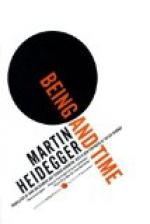|
This section contains 3,018 words (approx. 11 pages at 300 words per page) |

|
If literature can accurately be said to capture and embody knowledge, it follows that it embodies "truth" or objective reality. The capacity of poetry to capture reality, in the highest sense, has in our day been most forcefully asserted by Martin Heidegger.
His aesthetics, which amounts to a theory of poetry, is of the greatest importance as an effort to argue the fulness of poetry. The argument is a dominant concern of his recent thought, and shows how much its author had profited from the experiences with Being which he had already dramatized in Sein und Zeit…. Like all his thought, Heidegger's aesthetics is intended for the initiate and demands participation. It rewards a good reading, though, with latent power for new experiences of art.
Heidegger claims that poetry, or art, is something real. This is the basic assertion of his aesthetics, if the word "real" is taken...
|
This section contains 3,018 words (approx. 11 pages at 300 words per page) |

|


